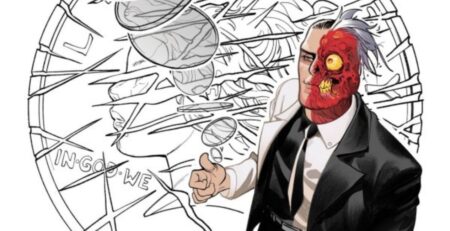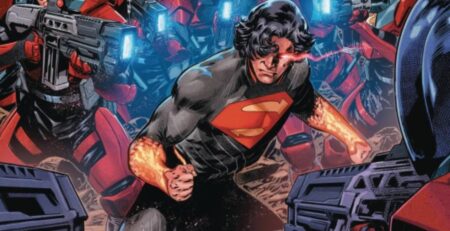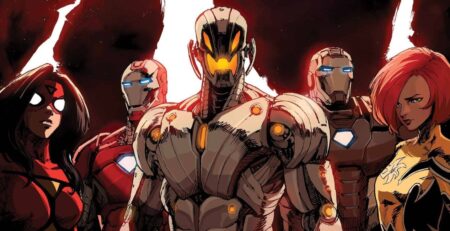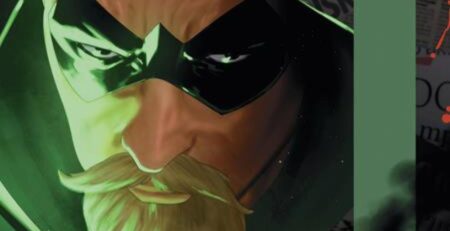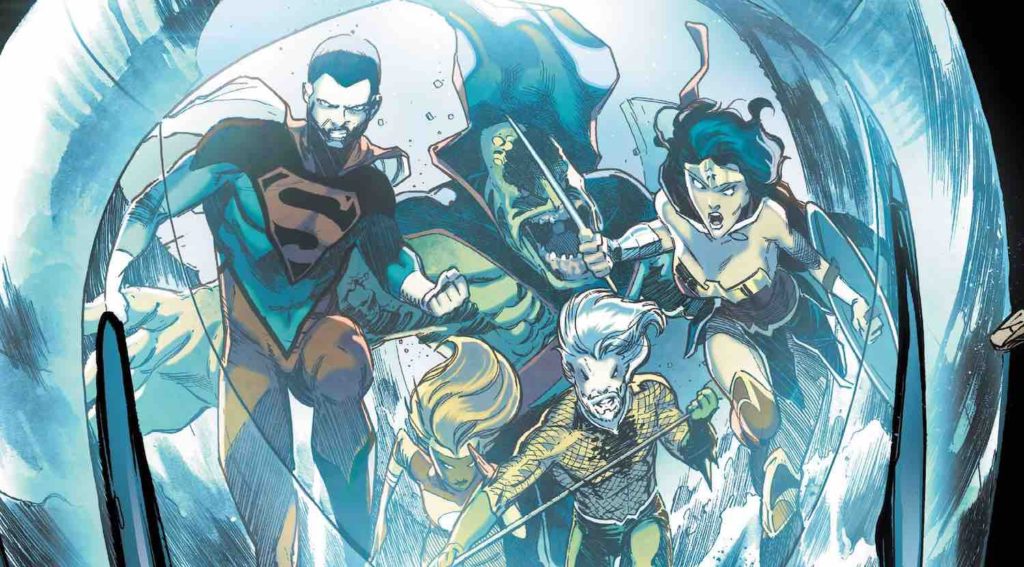
Future State: Suicide Squad #2 is published by DC Comics, written by Robbie Thompson and Jeremy Adams, art by Fernando Pasarin and Javier Fernandez, with inks by Oclair Albert, colors by Jeremy Fox and Alex Sinclair, and letters by Wes Abbott. As the Justice Squad puts the final touches on Waller’s plan to lock down the Earth from outsiders, Task Force X makes its move. Unfortunately, the element of surprise may not be on their side. Plus, in the distant future of the 853rd century, Gold Beetle has arrived and may bring the key to saving their universe.
It’s odd how much fiction loves to portray human growth as being made up of these particular moments in which an individual completely changes themselves. One moment, you are an antagonist. The next, through a singular act of good, you are Superman. If only it were that easy.
This oversimplification of how a person changes does the entire process a tremendous disservice. Often, a single moment when a character is pushed to the point where they have nothing left to lose will not alter years, if not decades, of ingrained behavior. Fiction is so oversaturated with this concept that when it comes time for many of us to make real change in our lives, we think that all it will take is one grand gesture, and we will be great. But in the end, good is something we are, not something we do.
Future State: Suicide Squad #2 sees the Justice Squad putting the finishing touches on Waller’s plan to protect the Earth from external threats forever. As they hurry to complete their boss’s objective, it is soon revealed that they are not alone. Task Force X had come for Waller, and they won’t leave without her.
While the showdown between the Justice Squad and Task Force X is brutal in its delivery, it lacks any real punch. The combat moments fall on the weak side in both excitement and style, and the deaths that happen are to characters that I barely even knew the names of for the most part. These deaths come as neither emotional, not visually impressive—they just kind of die.
The wrap-up of this side Future State: Suicide Squad #2 tries to pull everything together in far too clean a package. The tidy little bow the book wants readers to see holding the finale together just feels unearned. It tries to deliver a story that just needed more time to feel like the conclusion came about naturally.
The back half of the book returns readers to the 853rd century as Gold Beetle arrives, bearing hope for the universe. What follows is such a convoluted journey through magical realms and terms that there is little chance most readers will make sense of it after one reading. And just to make the situation worse, the ending, if it is even actually classifiable as an ending, makes no sense. A magical thing happens, and then the book ends. The reader isn’t even shown if the magical act had the desired effect. The book simply ends.
The art in both halves of Future State: Suicide Squad #2 do a solid job of delivering their stories. The many action moments are kept clear, and there is a great level of consistency throughout the art. This consistency is furthered by the good colorwork involved. Both stories are imbued with color palettes that go great with the tones and locales of their respective stories.
Wrapping up this book, we see a solid lettering performance by Abbott. While the letters throughout show skill and talent, it is the back half story that shines. With the strange and magical abounding, Abbott goes that extra distance with much of the dialogue giving it some extra flair for the reader to enjoy.
When all is said and done, Future State: Suicide Squad #2 is a mixed bag at best. While there are some good story moments and solid art, the book tries to do too much for the time it has, and some of what it does never really makes sense.
Future State: Suicide Squad #2 is available now wherever comics are sold.
Future State: Suicide Squad #2
TL;DR
When all is said and done, Future State: Suicide Squad #2 is a mixed bag at best. While there are some good story moments and solid art, the book tries to do too much for the time it has, and some of what it does never really makes sense.

